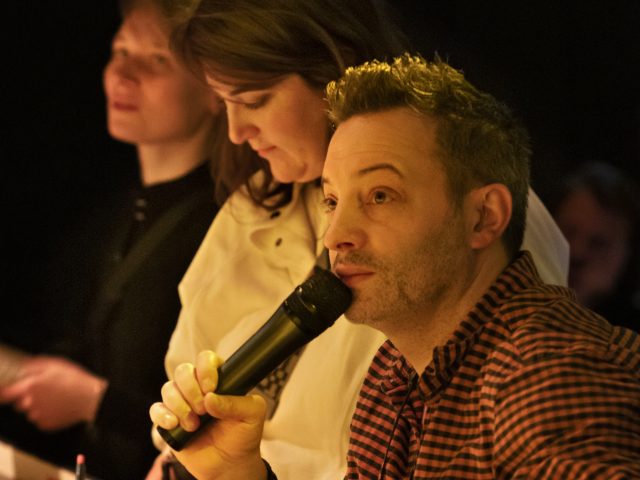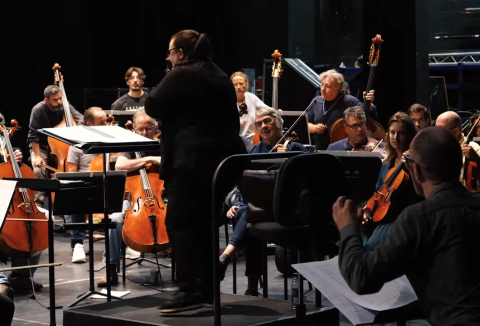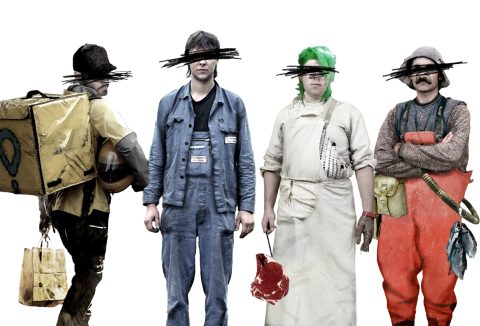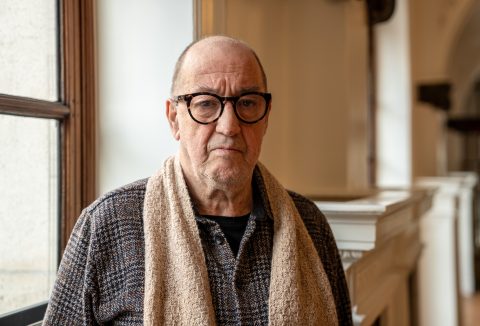Brodeck: a story that refuses to be forgotten
by Maarten Boussery, Fri, Jan 12, 2024

Philippe Claudel’s Brodeck’s Report is a dark parable about war, xenophobia and remembering. The successful 2007 novel forms the basis for the opera Brodeck, a world premiere by composer Daan Janssens and stage director Fabrice Murgia. The artistic duo talks us through the production, drawing on a few selected lines from the libretto.
‘Raconter des histoires, c’est un autre métier.’
‘Telling a story, that’s another thing entirely.’
DAAN JANSSENS While working on the chamber opera Menuet for LODmuziektheater a few years ago, Fabrice and I got talking about our next project. As with Menuet, after a novel by the same name by Louis Paul Boon, we were keen to again use a book as our point of departure. We were both drawn to Brodeck’s Report by Philippe Claudel, but it was really Manu Larcenet’s 2015 graphic novel adaptation that convinced us that the story would work in multimedia form. Claudel’s writing is highly descriptive and often shifts between the present and the past, which can be tricky to translate to the opera stage. A different medium demands a different way of telling a story. Larcenet inspired us to take on that challenge. We started by weighing how we would use music and our own visual language to present the story in a new way.
FABRICE MURGIA The graphic novel was interesting because it showed us that the story lends itself well to a rhythmic telling, which is crucial for an opera. Larcenet also created excellent visual depictions of the descriptions in the book. Opera allows us to go a step further by adding a musical layer. The libretto was drawn from Claudel’s original text, from which we distilled twenty-two scenes that follow the book’s premise. Based on the dialogues from those passages, Daan produced a first version of the libretto, which I then occasionally reworked: sometimes Claudel’s sentences are just too long to render as vocal lines. This was Daan’s cue to start composing the music. He often played things for me, and meanwhile I worked on the staging concept.
DAAN Much of the music already came to me as I was writing the libretto. The score became rather Wagnerian, with various motifs and specific instruments assigned to certain characters. For instance, there is music for the war that plagued the town prior to the Anderer’s arrival, music for Brodeck’s imprisonment at that time, a theme for his wife Emélia, and so on. As the listener gradually discovers the musical connections, they’ll be able to better follow the story’s chronology and feel the menacing undertone of certain conversations. The score also contains references to other operas. I’m sure that opera-lovers will appreciate the music: it is very expressive and lyrical, and contains operatic elements that the great composers knew to be effective.
‘L’Anderer était un miroir: sans prononcer le moindre mot, il renvoyait à chacun son image.’
‘The Anderer was a mirror: without uttering a single word, he showed everyone their true self.
FABRICE In the opera we portray the Anderer as an intriguing foreigner who arrives in a village still reeling from war and brutal, repressive occupation. The role of the Anderer is not taken by a singer, but rather by the actor Josse De Pauw. This makes the Anderer—in the genre of opera, too—a kind of intruder. He doesn’t communicate the way the rest of the characters do. He is a charismatic figure with magical qualities, he gets on well with the children, dresses eccentrically, writes and draws incessantly in a small notebook, talks to his horse and donkey but barely with the villagers… Somehow the townsfolk reach a point that they collectively form a negative image of him and kill him. Then two questions arise: why did this happen, and how will they collectively remember that violent event?
DAAN Since the Anderer has such a mysterious, surreal air about him, I’ve used instruments like the harp, celesta and vibraphone to evoke his sound world. The most powerful aspect of the Anderer is that we have no idea at all where he comes from. What is clear, though, is that he is capable of confronting others with their past. He’s a man of few words, but still he exposes the townspeople’s true nature. For people who have just been through a traumatic period of war, this is perhaps too confrontational. The mood can swing abruptly if people are made to see things they would rather not.
FABRICE I use live onstage camera projections to reconstruct Brodeck’s, the Anderer’s, and the village’s past. Authoring a report is a solitary undertaking that’s not particularly theatrical. But with a camera onstage we can visually bring Brodeck’s report to life. Steered by the music, we can zoom in on characters and study the events in detail, like in a film documentary, from the viewpoint of the chronicler. How we remember and retell the darker periods of history is an age-old debate. Just as the Anderer holds up a mirror to the villagers, the theatre can do the same for society. To quote Arthur Schopenhauer: ‘Not to go to the theatre is like making one’s toilet without a mirror.’
‘Schmutz Fremdër!’
'Dirty stranger!'
DAAN In the book, Philippe Claudel clearly alludes to the horrors of World War II and the Holocaust: the fear of outsiders, Brodeck’s internment in a death camp and the many German words and names. But despite the concrete link with recent history, the story is universal and allegorical. To this day we still face xenophobia, the violence of war, toxic masculinity and collective traumas. We wanted to respect that aspect of the book, and it was likewise Claudel’s only explicit wish: that we not place the story in a German border town in 1940. Otherwise we had complete artistic freedom. The universality of music helps to open up the story to broader contexts.
FABRICE So indeed, for the scenography we avoided evoking an explicit connection to WWII. All the action takes place in the space where Brodeck writes his report; the villagers, like a sort of local tribunal, watch their own trial. They look as though they’ve just come from a concentration camp: their outfits are a hodgepodge of what they have scavenged from the ruins. They are in survival mode, trying to make a clean start, but they’re still in their old attire. In this way I hope that audiences will be able to associate this with other actual, historical events. At the same time we watch as Brodeck, the ‘stager’ of the reconstruction, is confronted with the kind of personal traumas that inevitably accompany such a far-reaching societal catastrophe.
‘Les morts ne quittent jamais les vivants.’
‘The dead never abandon the living.’
DAAN The villagers are eager to put the past to rest and hope that Brodeck’s report will close the book on the incident with the Anderer. But Brodeck cannot forget. I personally don’t have a war trauma, but I can imagine that for some people, bottling it up is the only option. But as long as there are people who had something to do with those deaths, it is impossible to wipe them from one’s memory. For as long as there are living beings, we will remember. Children – the next generation that has inherited the collective traumas of its predecessors – play a key role in the opera. That generation embodies hope: they can transcend their parents’ uptightness and give the past a place. Remembering and accepting are the key to the future.
FABRICE The opera Brodeck is about the inability to reconstruct the past as truth, and the ability to understand and accept things. I am aware that some people go to the opera to enjoy the music and understand the story. That last element is precisely what Brodeck struggles with. And the audience will, too.
Photo top: Fabrice Murgia ©Annemie Augustijns
Video: Mario De Munck
Discover more
Antwerp | Gent
Brodeck
Daan Janssens



